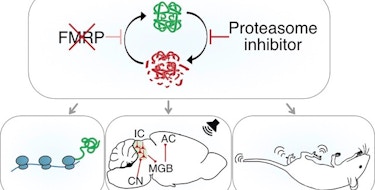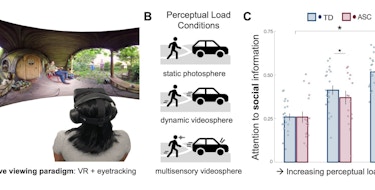Children with autism spectrum disorder (ASD) often present with delays in motor development and learning, such as in crawling, walking and speech. A recent study in mice from SFARI Investigator Simon Chen suggests that altered signaling in a small region of the brainstem, the locus coeruleus (LC)-noradrenaline (NA) system, play a role in these delays.
Individuals carrying deletions within the 16p11.2 chromosomal region present with a variety of neuropsychological features, including many associated with ASD. The current study found that a mouse model of the 16p11.2 deletion demonstrated a clear delay in motor learning without an overall change in gross motor skills. To examine the underlying causes of this delay, Chen’s team utilized in vivo two-photon imaging and pharmacogenetic manipulations in combination with motor-learning analyses in the 16p11.2 deletion mice.
Chen’s laboratory previously found that typical motor learning in wild-type mice affects neuronal spine development and the activity patterns of excitatory neurons within layer (L) 2/3 of the motor cortex and that this regulates motor-skill learning (Chen et al., Nat. Neurosci., 2015; Peters et al., Nature, 2014). The current study found that 16p11.2 deletion mice exhibit higher than normal levels of L2/3 excitatory neuron activity, altered activity patterns and a prolonged process of neuronal spine reorganization within the motor cortex.
In the motor cortex, neuromodulators such as dopamine (DA), acetylcholine (ACh) and NA help to regulate neural activity during motor learning, and neuromodulator dysfunctions have been reported in individuals with ASD (Bast et al., Eur. J. Neurosci., 2018). Looking in the 16p11.2 mice, Chen found that DA and ACh neuron activity was unaffected but that there was a significant decrease in LC-NA neuron activity during motor learning. Critically, increasing NA neuron activity in 16p11.2 deletion mice by using a DREADD-based pharmacogenetic approach rescued L2/3 excitatory neuron activity and spine organization and motor learning.
Combined, these findings strengthen the idea that L2/3 excitatory activity is critical for motor learning. They further suggest that changes in this process, resulting from reductions in LC-NA neuronal modulation, contribute to delays in motor learning caused by 16p11.2 deletion. Future studies could take advantage of other genetic models of ASD to explore whether this mechanism may play a more general role in motor delays associated with ASD risk genes.
Reference(s)
Delayed motor learning in a 16p11.2 deletion mouse model of autism is rescued by locus coeruleus activation.
Yin X., Jones N., Yang J., Asraoui N., Mathieu M.-E., Cai L., Chen S.


